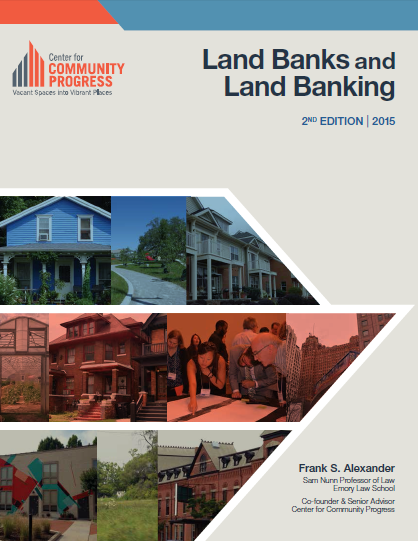New Land Banks Publication Features Research, Guidance, Sample Legislation (Press Release)
June 18, 2015

 WASHINGTON, D.C. – The Center for Community Progress today announced the release of Land Banks and Land Banking, 2nd Ed., by Frank S. Alexander, law professor at Emory University and co-founder of the Center for Community Progress.
WASHINGTON, D.C. – The Center for Community Progress today announced the release of Land Banks and Land Banking, 2nd Ed., by Frank S. Alexander, law professor at Emory University and co-founder of the Center for Community Progress.
Land Banks and Land Banking, 2nd Ed. is available to download at no cost through the Center for Community Progress website.
“The first edition of Land Banks and Land Banking helped to usher in a new era of sophistication in land banking,” said Tamar Shapiro, president and CEO of the Center for Community Progress. “This second edition is poised to have a similarly profound impact with new research and resources to help land banks tackle vacant properties and strengthen neighborhoods.”
The updated second edition of Land Banks and Land Banking builds upon the legacy of the first, released in 2011, which shaped land bank enabling laws in as many as eight states and impacted the operations of land banks nationwide.
Land Banks and Land Banking, 2nd Ed. combines research on land banks with practical guidance. It is targeted at practitioners who work with or are exploring the creation of land banks, as well as researchers seeking to understand the role of land banks within the broader fields of land use law, community development, urban policy, and urban planning.
At the state level, Land Banks and Land Banking, 2nd Ed. includes a first-of-its-kind, at-a-glance comparison of existing state land bank statutes that examines the powers, priorities, and structures of land banks across states. The publication also includes a template for state land bank legislation.
At the local level, it features in-depth guidance on creating, structuring, operating, and sustaining a land bank – including sample administrative policies and examples of land banks in Atlanta, Georgia, Genesee County, Michigan, and Cuyahoga County, Ohio.
Download a copy of the second edition of Land Banks and Land Banking on the Center for Community Progress website.
About Frank S. Alexander
Frank S. Alexander is the Sam Nunn Professor of Law at Emory University School of Law and is co-founder and senior advisor to the Center for Community Progress. He is the author or editor of eleven books and more than fifty articles in real estate finance, community development, and law and theology, including Georgia Real Estate Finance and Foreclosure Law 2014-2015 (10th Ed., 2014). Professor Alexander’s work has focused on homelessness, affordable housing, and community development, serving as a fellow of the Carter Center of Emory University (1993-96), and as a Commissioner of the State Housing Trust Fund for the Homeless (1994-98). He has served as interim dean of Emory University School of Law (2005-06), as Visiting Fellow at the Joint Center for Housing Studies, Harvard University (Fall Semester 2007), and has testified before U.S. Congress concerning the mortgage foreclosure crisis. Professor Alexander received his JD from Harvard Law School, a Masters in Theological Studies from Harvard Divinity School, and his BA from the University of North Carolina.
About the Center for Community Progress
Founded in 2010, the Center for Community Progress is the only national 501(c)(3) nonprofit organization solely dedicated to building a future in which entrenched, systemic blight no longer exists in American communities. As a national leader on solutions for blight and vacancy, Community Progress serves as the leading resource for local, state and federal policies and best practices that address the full cycle of property revitalization, from blight prevention, through the acquisition and maintenance of problem properties, to their productive reuse. More information is available at communityprogress.org.
Recent Press Releases
Subscribe to join 14,000 community development leaders getting the latest resources from top experts on vacant property revitalization.
